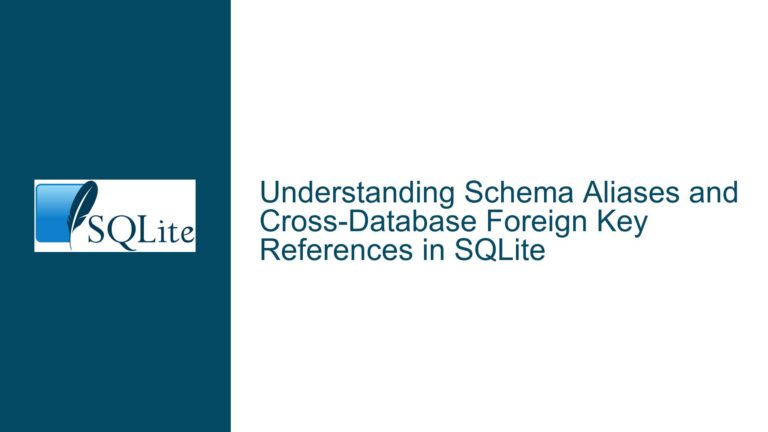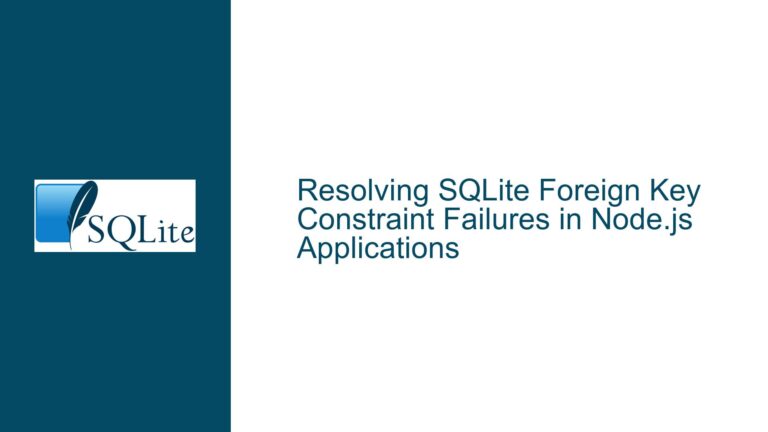Foreign Key Constraint Failure on Commit with Deferred Foreign Keys in SQLite
Issue Overview: Foreign Key Constraint Failure on Commit with Deferred Foreign Keys
When working with SQLite, one of the most powerful features is its support for foreign key constraints, which ensure referential integrity between tables. However, a nuanced issue arises when using the PRAGMA defer_foreign_keys = ON setting, particularly during table migrations or schema alterations. The problem manifests as a "FOREIGN KEY constraint failed" error upon committing a transaction, even though PRAGMA foreign_key_check reports no issues. This discrepancy can be confusing and frustrating, especially when the migration process follows SQLite’s recommended practices for altering tables.
The core of the issue lies in the interaction between deferred foreign key constraints and the sequence of operations performed within a transaction. Specifically, when PRAGMA defer_foreign_keys = ON is enabled, foreign key constraints are not immediately enforced during the execution of individual SQL statements. Instead, the enforcement is deferred until the transaction is committed. This deferral allows for temporary violations of foreign key constraints within the transaction, which can be useful during complex schema changes or data migrations. However, if the deferred constraints are not properly resolved before the commit, SQLite will raise a foreign key constraint error.
In the provided scenario, the user attempts to perform a table migration by creating a new table (Node_migration_new), copying data from the original table (Node), dropping the original table, and renaming the new table to the original table’s name. This process is executed within a transaction with PRAGMA defer_foreign_keys = ON. Despite the use of PRAGMA foreign_key_check to verify the integrity of foreign key constraints before committing, the transaction fails with a foreign key constraint error. The error occurs because the DROP TABLE statement introduces foreign key constraint violations that are not detected or resolved by the subsequent ALTER TABLE RENAME statement.
The issue is further complicated by the behavior of PRAGMA defer_foreign_keys = OFF. When this pragma is set before committing the transaction, the foreign key constraint error is bypassed, and the transaction succeeds. This behavior suggests that the deferred foreign key constraint mechanism is not fully integrated with certain schema-altering operations, such as DROP TABLE and ALTER TABLE RENAME. As a result, the foreign key constraint counter, which tracks violations, remains non-zero at the time of commit, leading to the error.
Possible Causes: Deferred Foreign Key Constraints and Schema Alterations
The root cause of the foreign key constraint failure on commit lies in the interaction between deferred foreign key constraints and the specific sequence of schema-altering operations performed within the transaction. To understand this issue in depth, it is essential to examine the underlying mechanisms of foreign key constraint enforcement in SQLite and how they are affected by the PRAGMA defer_foreign_keys setting.
SQLite enforces foreign key constraints using a counter mechanism. When a foreign key constraint is violated, the counter is incremented. Conversely, when a violation is resolved, the counter is decremented. SQLite raises a foreign key constraint error when the counter is non-zero at the time of constraint checking. Constraint checking occurs either at the end of each SQL statement or just before the transaction commits, depending on the setting of PRAGMA defer_foreign_keys.
When PRAGMA defer_foreign_keys = ON is enabled, foreign key constraint checking is deferred until the transaction is committed. This deferral allows for temporary violations of foreign key constraints within the transaction, which can be useful during complex schema changes or data migrations. However, if the deferred constraints are not properly resolved before the commit, SQLite will raise a foreign key constraint error.
In the provided scenario, the DROP TABLE statement introduces foreign key constraint violations by removing the Node table, which is referenced by the Job table. Since PRAGMA defer_foreign_keys = ON is enabled, these violations are not immediately detected. The subsequent ALTER TABLE RENAME statement renames the Node_migration_new table to Node, effectively restoring the original table structure. However, this operation does not decrement the foreign key constraint counter, as ALTER TABLE RENAME does not recognize the resolution of the violations introduced by the DROP TABLE statement.
As a result, the foreign key constraint counter remains non-zero at the time of commit, leading to the "FOREIGN KEY constraint failed" error. The PRAGMA foreign_key_check statement, which is executed before the commit, does not detect any issues because it only checks for unresolved foreign key constraint violations at the time of its execution. Since the ALTER TABLE RENAME statement has already restored the table structure, the foreign key constraints appear to be satisfied at that point.
The behavior of PRAGMA defer_foreign_keys = OFF further complicates the issue. When this pragma is set before committing the transaction, the foreign key constraint error is bypassed, and the transaction succeeds. This behavior suggests that the deferred foreign key constraint mechanism is not fully integrated with certain schema-altering operations, such as DROP TABLE and ALTER TABLE RENAME. As a result, the foreign key constraint counter, which tracks violations, remains non-zero at the time of commit, leading to the error.
Troubleshooting Steps, Solutions & Fixes: Resolving Deferred Foreign Key Constraint Issues
To resolve the issue of foreign key constraint failure on commit with deferred foreign keys, it is essential to understand the underlying mechanisms and adopt appropriate strategies to ensure that foreign key constraints are properly enforced and resolved within the transaction. The following steps and solutions provide a comprehensive approach to troubleshooting and fixing the issue.
1. Understanding the Behavior of Deferred Foreign Key Constraints:
The first step in resolving the issue is to gain a thorough understanding of how deferred foreign key constraints work in SQLite. When PRAGMA defer_foreign_keys = ON is enabled, foreign key constraint checking is deferred until the transaction is committed. This deferral allows for temporary violations of foreign key constraints within the transaction, which can be useful during complex schema changes or data migrations. However, if the deferred constraints are not properly resolved before the commit, SQLite will raise a foreign key constraint error.
To avoid this issue, it is crucial to ensure that all foreign key constraint violations introduced within the transaction are resolved before the commit. This can be achieved by carefully planning the sequence of operations and using appropriate SQL statements to resolve any violations.
2. Properly Resolving Foreign Key Constraint Violations:
In the provided scenario, the DROP TABLE statement introduces foreign key constraint violations by removing the Node table, which is referenced by the Job table. To resolve these violations, it is necessary to ensure that the foreign key constraints are satisfied before the transaction is committed.
One approach to resolving the issue is to use PRAGMA defer_foreign_keys = OFF before committing the transaction. This pragma forces SQLite to check the foreign key constraints immediately, rather than deferring the check until the commit. By setting PRAGMA defer_foreign_keys = OFF before the commit, any unresolved foreign key constraint violations will be detected and raised as errors, allowing you to address them before proceeding with the commit.
Another approach is to explicitly resolve the foreign key constraint violations within the transaction. For example, you can update the Job table to remove or update any rows that reference the Node table before dropping the Node table. This ensures that the foreign key constraints are satisfied before the DROP TABLE statement is executed.
3. Using Alternative Schema Migration Strategies:
The issue arises from the specific sequence of operations used in the table migration process. To avoid the problem, consider using alternative schema migration strategies that do not rely on deferred foreign key constraints. For example, instead of dropping and renaming tables within the same transaction, you can use a multi-step migration process that ensures foreign key constraints are always satisfied.
One such strategy is to create a new table with the desired schema, copy the data from the original table to the new table, and then update any foreign key references to point to the new table. Once the data has been successfully migrated and the foreign key constraints are satisfied, you can drop the original table and rename the new table to the original table’s name. This approach ensures that foreign key constraints are always enforced and avoids the need for deferred foreign key constraints.
4. Testing and Validating Foreign Key Constraints:
To ensure that foreign key constraints are properly enforced and resolved within the transaction, it is essential to test and validate the constraints at each step of the migration process. Use PRAGMA foreign_key_check to verify that there are no unresolved foreign key constraint violations before committing the transaction. If any violations are detected, address them before proceeding with the commit.
Additionally, consider using SQLite’s PRAGMA integrity_check to verify the overall integrity of the database after the migration process. This pragma performs a comprehensive check of the database, including foreign key constraints, and reports any issues that need to be addressed.
5. Updating to the Latest Version of SQLite:
The issue has been reproduced with SQLite versions 3.31.1 and 3.39.2. While the behavior is consistent across these versions, it is always a good practice to use the latest version of SQLite, as it may include bug fixes and improvements related to foreign key constraint enforcement. Check the SQLite release notes for any updates or changes related to foreign key constraints and deferred foreign key checking.
6. Consulting the SQLite Documentation and Community:
SQLite’s official documentation provides detailed information on foreign key constraints, deferred foreign key checking, and schema migration strategies. Review the documentation to gain a deeper understanding of the mechanisms involved and to identify best practices for handling foreign key constraints during schema changes.
Additionally, consider consulting the SQLite community, including forums and mailing lists, for advice and insights from other users who may have encountered similar issues. The community can provide valuable feedback and alternative solutions based on their experiences.
By following these troubleshooting steps and solutions, you can effectively resolve the issue of foreign key constraint failure on commit with deferred foreign keys in SQLite. The key is to understand the behavior of deferred foreign key constraints, properly resolve any violations within the transaction, and adopt alternative schema migration strategies that ensure foreign key constraints are always enforced. With careful planning and testing, you can avoid the pitfalls of deferred foreign key constraints and achieve a successful schema migration.






